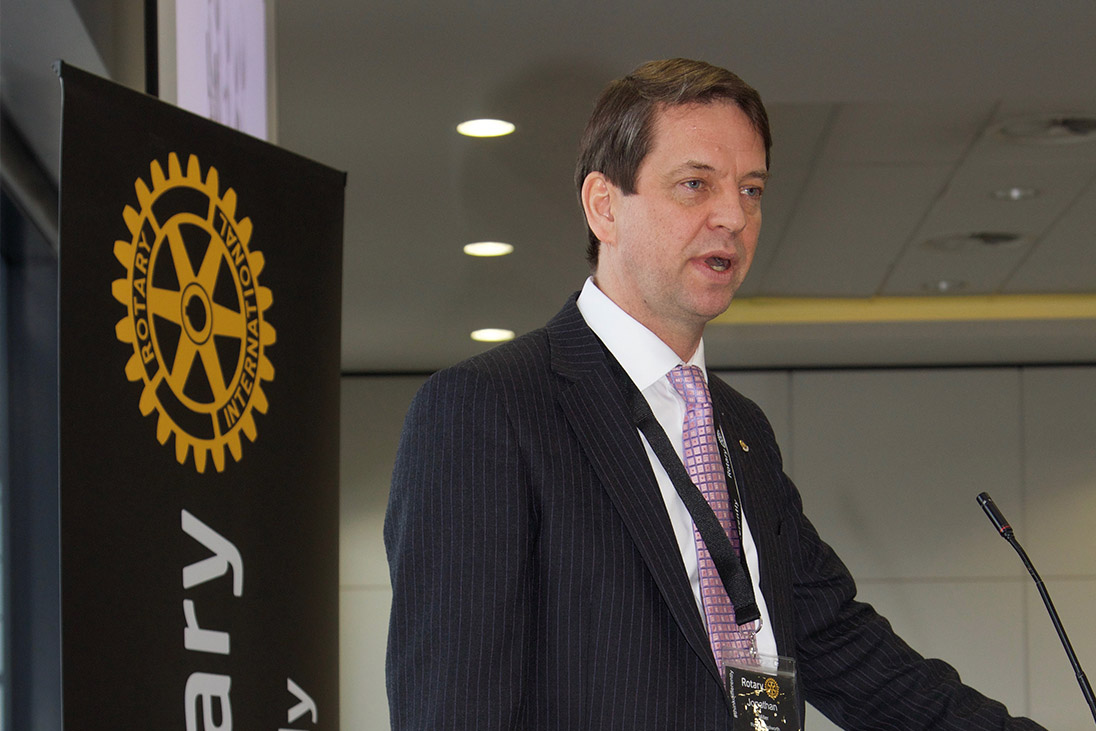Picture the scene at the AJ Bell Stadium in Salford in March earlier this year. It was March 2nd, 2018, the coldest day of the year when the Beast from the East was howling.
But this was the day when Think Differently was hatched.
More than 200 Rotary members had gathered for what was being promoted as a joint public image and membership seminar, featuring speakers discussing change management and success stories of club innovation.
But that was only the half of it!
Those who braved the Arctic conditions did so because they wanted to discuss how to do Rotary differently in their town. Everything was themed black and white – all within brand guidelines, of course, – as facilitators wore black polo shirts with ‘Think Differently’ emblazoned on the front and ‘I do’ on the back.
The key speaker was change management consultant, Jonathan Miller, who assists commercial and charitable organisations to orchestrate change and make strategic shifts in their way of thinking.
Incidentally, Jonathan was President of Rotary Kenilworth, Warwickshire, from 2017-18.
Jonathan was thought-provoking and controversial, who questioned every boundary and obstacle which was thrown his way – the audience were blown away with his audacity.


Keynote speaker Jonathan Miller
Gill Bainbridge from the Merseyside Youth Association opened her session with a video of David Bowie’s ‘Changes’. Soon, heads were up, and everyone was engaged.
Gill spoke about the continual reform of her organisation, and what she and her teams have had to do to keep the charity’s approach fresh and dynamic.
We had speakers talk about satellite groups, flexible clubs and e-clubs.
And in the break-out sessions, every aspect of Rotary was discussed with ideas in abundance.
Suddenly Rotarians were getting Think Differently – a post seminar survey revealed that 79% of respondents reckoned the event had made them think about the future of Rotary in their clubs, and a staggering 87% insisted they would discuss Think Differently at their club.
So, what was this all about? Well, the idea originally was to hold a district membership seminar to talk about new, flexible ways of doing Rotary.
As discussions unfolded, it became clear that it needed to be more than telling Rotarians you don’t have to attend meetings every week, or meet at different times, or even relinquish the evening meal.
We wanted a cultural change in the district, and we wanted club Rotarians to see the benefits of thinking differently about Rotary for themselves.
The catalyst for the event was the successful application of a Membership Development Grant through Rotary in Great Britain & Ireland which allowed us to think of a bigger event.
Of course, Rotary 2 has been running successfully over the past year, creating around 200 new clubs, and promoting flexible ways of doing Rotary.
Rotary 2 is the framework change and mechanism which allows clubs to make changes.
Think Differently is the cultural change process; changes to individual and district thought processes.
Both concepts sit alongside one another, and both will help to ensure the longevity and vibrancy of Rotary.
Rotarians need to critically assess the future of Rotary in their town.
They need to determine whether they are positively enhancing the image of Rotary and future-proofing the organisation.
By adopting some of the cultural changes which Think Differently proposes, Rotary will be revitalised and continue to thrive.
In line with Rotary 2, clubs are encouraged to offer flexible packages to new members; less traditional, more inclusive and participatory – flexible clubs, e-clubs and satellite clubs.
Think Differently takes it beyond that framework and makes quite a few bold statements.
- Language: we are suggesting that use of the words membership and members are replaced with volunteers and volunteer engagement. We suggest that the formal language used in much of our correspondence and in meetings is replaced with more current business language.
- Project driven: we suggest the prime motivator to attract new volunteers is to offer projects, not just fund-raising schemes. These are local and international projects which will attract future volunteers. This is in stark contrast to a membership drive as the primary function. We believe projects will attract a larger volunteer base and, in turn, enhance the offering to potential volunteers.
- Large scale projects: encouragement of large-scale projects and working together with other Rotary clubs and external partners. An example is the Rise Against Hunger meal packing events recently held by a number of Rotary districts.
- Other volunteer models: look towards other volunteer sector models as good examples of what can be done to attract volunteers and how service organisations can be made to flourish and survive. For example, the Merseyside Youth Association and the National Trust.
Rotarians should think about how Rotary is perceived in their town and the impact it is having.
Think, is your club inclusive and participatory? Does it meet the needs of the community, either at home or abroad?
By changing a few simple traditions, this can positively impact the way volunteers, potential members and stakeholders view Rotary in the community.
If Think Differently succeeds, it could completely change the trajectory of Rotary in the UK.


























































